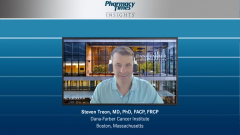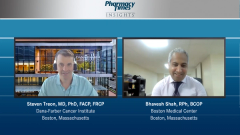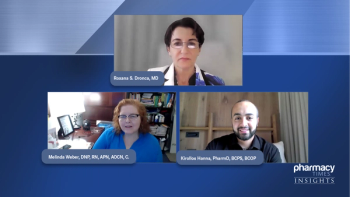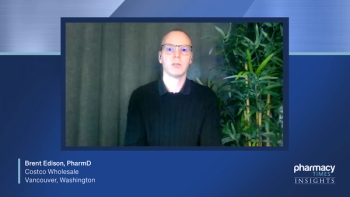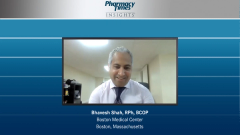
Waldenstrom Macroglobulinemia: First-Line Treatment Decisions
The top considerations of hematologists and oncologists when selecting first-line treatment for patients with Waldenstrom macroglobulinemia.
Episodes in this series

Bhavesh Shah, RPh, BCOP: You have oral options, and we know that we’re always faced with cost pressures in terms of using the most cost-effective therapies. You have multiple BTK [Bruton tyrosine kinase] inhibitors. You have biosimilars. Bendamustine [Treanda] is generic, so if you look at it from a cost perspective, you probably think that bendamustine and rituximab [Rituxan] biosimilar is probably the least costly for a patient, and also having that fixed duration option for a patient. How does the physician determine the most appropriate agent for frontline treatment? Maybe cost doesn’t even factor into that.
Steven Treon, MD, PhD, FACP, FRCP: As providers, we don’t usually think about the cost of therapy. But on the other hand, we are cognizant of it, especially in the Medicare population in the United States where copays are an important problem when you’re thinking about oral-based therapy. You sometimes have patients who are prescribed a BTK inhibitor but then have a $2000 per month copay, and that becomes very prohibitive. All of us are very sensitive to that. Thankfully, many of the companies that provide BTK inhibitors also have programs that can help folks who are struggling. The pharmacist role here is very important. Our pharmacists are very helpful in that regard. But therapy can’t just be a dollar sign, and I’m going to tell you why.
We can go back to bendamustine. If you think about the fact that it’s an alkylator, there’s a risk of myelodysplasia. I’ve seen it. I’ve had patients die of leukemia who got MDS [myelodysplastic syndromes] related to bendamustine, and this was their first line of therapy. You really want to minimize exposure, particularly with younger patients. The trick there is that the older the oncologist is, the younger everybody else starts looking. This is why when you say young, what does that mean anymore? Is it your 60-year-old? Is it your 70-year-old? We have to be cognizant of the fact that MDS is a real problem with bendamustine. I’m certainly not going to give bendamustine or another type of alkylator to my 40-year-olds if I can avoid it. You wouldn’t want to do fludarabine, for sure. We see way too much MDS and AML [acute myeloid leukemia] with that. Those are just examples.
With proteasome inhibitors, you have to be aware of whether you’ve got somebody who can’t afford to ever have neuropathy, like a pilot, where it’s very important to have instrument control and feel. You have to think through what might be the consequences of therapy when you’re choosing the ideal drug. This is why we tend to default more and more these days to even using a BTK inhibitor frontline, because it also gives patients the convenience of being home and not having to be in the hospital. In these COVID-19 times, it became an important thing for people to be at home and not be exposed to a hospital environment. And it really humanizes the whole experience.
As you know, I led the first BTK inhibitor trial. It was the pivotal trial that led to FDA and EMA [European Medicines Agency] approval. But it was really a transformative trial because you no longer had to strap a patient down in a hospital setting to provide them with optimal therapy. And BTK inhibitors are truly targeted therapies. No matter how many lines of therapy the patient has seen, the response rate is the same. That tells us that we’re absolutely hitting the critical target. And when you see acquired resistance developing, for the vast majority of patients with Waldenstrom, it’s a BTK C481 mutation, which is where the drug binds. In fact, some of the patients that we treat have multiple BTK cysteine mutations, multiple different types, which tells you that you’re putting highly selective pressure on a target that’s vital to the tumor’s growth and survival.
Transcript edited for clarity.
Newsletter
Stay informed on drug updates, treatment guidelines, and pharmacy practice trends—subscribe to Pharmacy Times for weekly clinical insights.

